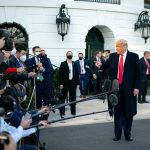In a groundbreaking move that underscores the Trump administration’s commitment to revitalizing American manufacturing and securing national interests, Taiwan Semiconductor Manufacturing Company (TSMC) has announced a $100 billion investment to expand its operations in the United States. This monumental deal, revealed alongside former President Donald Trump and TSMC CEO C.C. Wei at the White House, will fund the construction of three additional semiconductor fabrication plants, two advanced packaging facilities, and a research and development center in Arizona. The investment brings TSMC’s total U.S. commitment to $165 billion, marking a pivotal step in reshoring critical industries.
This initiative aligns with Trump’s long-standing goal of reducing America’s reliance on foreign supply chains, particularly from China and East Asia, which currently dominate global semiconductor production. The new facilities will produce cutting-edge chips essential for artificial intelligence (AI), 5G, and advanced manufacturing, ensuring that the United States remains competitive in these transformative technologies. Trump emphasized the strategic importance of this investment, declaring that “semiconductors are the backbone of the 21st-century economy” and asserting that America must build these critical components domestically to safeguard both economic and national security.
The economic implications of this deal are profound. Arizona is set to become a hub for high-tech innovation, with thousands of high-paying jobs expected to be created in engineering, manufacturing, and research. Local leaders, including Representative Eli Crane and Phoenix Mayor Kate Gallego, have hailed the investment as a transformative victory for their state. Beyond job creation, the expansion strengthens America’s semiconductor ecosystem, reducing vulnerabilities exposed during recent chip shortages that disrupted industries from automotive to consumer electronics.
From a geopolitical perspective, this investment sends a strong message about America’s resolve to reclaim its manufacturing dominance. By diversifying its production footprint outside Taiwan, TSMC mitigates risks associated with escalating tensions between Taiwan and China while bolstering U.S.-Taiwan relations. However, some in Taiwan have expressed concerns about the potential “hollowing out” of their semiconductor industry—a pillar of their economy and defense strategy. Despite these anxieties, TSMC has assured that its most advanced technologies will remain in Taiwan for now.
This historic deal represents more than just an economic boon; it is a strategic recalibration of America’s role in the global technology landscape. By prioritizing domestic production over foreign dependence, Trump has laid the groundwork for an industrial renaissance that aligns with conservative values of self-reliance and national sovereignty. As America strengthens its position as a leader in semiconductor manufacturing, this investment not only secures technological independence but also reaffirms the nation’s ability to compete on the world stage. The question now is: what other industries will follow this model of bringing production back home? With momentum building, the possibilities for American manufacturing are limitless.




